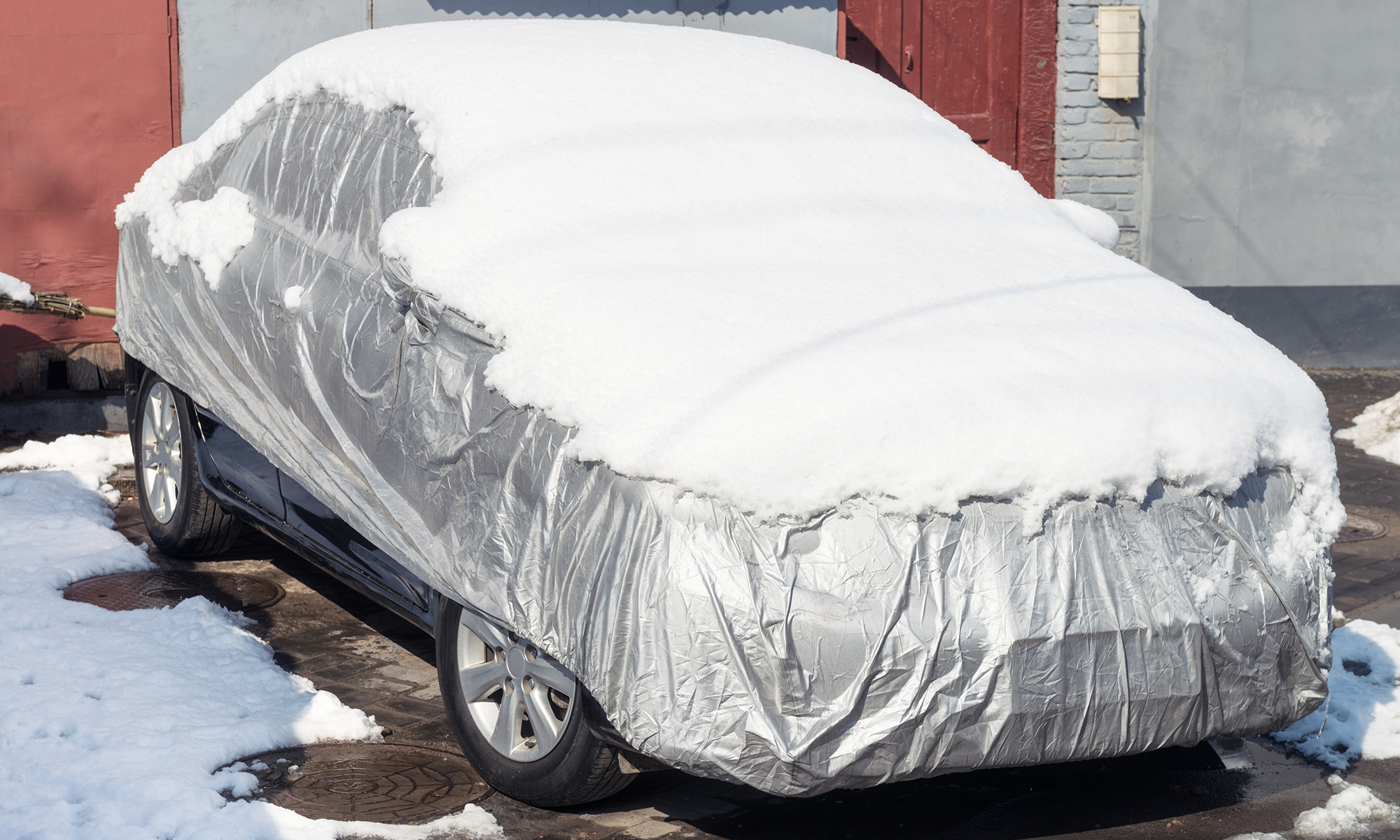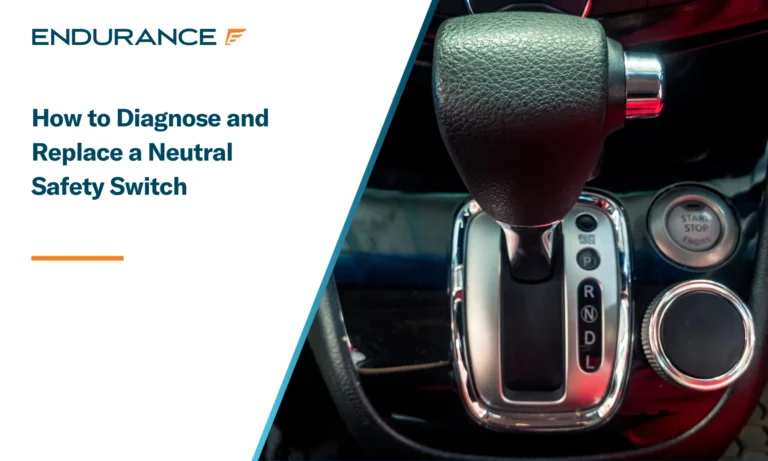How to Store a Car for the Winter

With the holidays out of the way and winter travel winding down, you may not be driving your vehicle as much. In fact, many might be getting ready to store their vehicle for the winter. Whether you have a vehicle dedicated to winter driving or work from home and don’t leave your house much, knowing how to store your vehicle for winter can help to prevent future repairs.
In addition to keeping up with your car’s regular maintenance schedule, there are a few tips and tricks you can do to ensure your vehicle stays safe while stored away for the winter. Today, we will look at how winter weather impacts your vehicle and what you should do to prep your car for storage.
How Winter Weather Affects a Car
Your car is full of intricate systems that the weather can easily impact. You must keep your vehicle prepared and properly maintained for the drastic temperature differences from the high summer to the below-freezing winter temperatures. When temperatures drop below freezing, your engine’s fluids can thicken or freeze if not properly treated.
Cold weather can also greatly impact electronics such as your battery. Car batteries operate by an electrochemical reaction, which slows down when the temperatures drop. This is why many batteries are harder to start or die in the winter. When purchasing a battery, look for one with higher CCA or cold cranking amps to get more cranking power in colder temperatures.
Winter weather also brings severe weather, such as snow and sleet. To quickly clear the roads, many cities use sand and salt to melt the snow. While salt is great for melting snow quickly when cars drive over the melted snow, this salt water is kicked onto the underside of the vehicle. This causes severe rust on metal components such as fenders, floor pans, and rocker panels.
When the temperatures start to drop, your vehicle might suffer from the following:
- Lower Tire Pressure
- Increased Chance Of Rust/Corrosion
- Hard Start Symptoms
- Deterioration Or Breakdown Of Rubber Seals
- Thickening Of Fluids
- Stiffer Suspension
How To Store A Car For The Winter
Knowing some general storage tips for winter is vital, whether you have to store your car for a few days to get past a snowstorm or put it away until spring. Ideally, you should store your vehicle in a garage or under a covered garage port to keep it out of the elements as much as possible. If you cannot keep your vehicle out of the elements, you can still follow these great tips; however, you might want to invest in a car cover to keep snow, ice, and debris off your paint.
Check/Top Off Fluids
Your engine contains various fluids, from coolant and antifreeze to engine oil and transmission fluid. These are vital to keeping your car running at its best, but they must be at the proper level. Most of your fluid reservoirs will have a built-in indicator that lets you easily check your fluid level. Before storing your car for the winter, you must check your fluids for any leaks and top them off as needed. It is also a great time to get an oil change to ensure you have fresh oil in your engine.
Use a Fuel Stabilizer
You’ll hear two trains of thought when it comes to the gas in your car when storing it. Some will swear that you should drain the gas tank, but that’s a process that can take time and equipment the average car owner may not have. Instead, storing a car with a full tank of gas will help prevent moisture buildup, but you still have to take a few extra steps.
If you plan to put your car into long-term storage, you will need to add a fuel stabilizer to keep it and your engine in good condition. Essentially, it is a fluid you pour into your gas tank to keep your gasoline from going bad (yes, gasoline can go bad). Most fuel stabilizers can keep fuel fresh for six months or longer. Check the stabilizer instructions to find out how much you need to add in relation to how much gas is in the fuel tank.
Give the Car a Deep Clean
Whether you are storing your car in a garage, under a car cover, or even out in the elements, you will want to deep clean your car before setting it away. Giving your vehicle’s paint a deep clean and a fresh coat of wax will ensure that all the dirt and contaminants have been removed to reduce scratches and preserve your paint’s luster. You can even take it a step further and place a plastic tarp or car cover over the vehicle.
You will also want to ensure the inside of your vehicle is cleaned before storing it away for the winter. Over time, dirt and grime can break down your interior’s plastic components, leaving you with a stained and worn-out interior. You will also want to ensure you have removed any food and drinks from your vehicle. This can attract rodents that might burrow and nest in your vehicle for the winter.
Critter Proof Your Car
Speaking of rodents, it is a good idea to critter-proof your car (and garage if you have one) to ensure you do everything you can to deter mice and other small animals from entering your vehicle. Mice are notorious for calling stored vehicles home, especially in the winter when cars can provide a warmer home for them. Rodent infestations leave behind feces, urine, leaves, and chewed-up wiring, which can completely destroy a vehicle. You can use steel wool in the small openings in your vehicle and mothballs or dryer sheets in the interior to deter mice and other rodents from entering.
Disconnect or Remove the Battery
To keep your car battery in the best condition possible and reduce the chances of it draining during the winter months, disconnect or remove the battery completely from the vehicle. Disconnecting the battery will ensure that it does not slowly drain from parasitic draw, which can happen quickly in the winter. Removing the battery and storing it in a climate-controlled area can protect it from being damaged by colder weather. It will also help to reduce the buildup of oxidation on the terminals. Alternatively, you can use a trickle charger or battery tender to keep your battery charged when stored for an extended period of time.
Place the Car on Jack Stands
If you have access to a jack and jack stands, placing your car on them can help reduce the chances of your tires flat spotting, especially if you’ll be storing the vehicle for long periods. Flat spotting occurs when a vehicle sits in one position too long, and the vehicle’s weight creates a permanent indention in the tire. By safely placing your car on jack stands on level ground, you can prevent flat spots and keep your car safer from critters.
Keep Your Car Protected All Year Long with Endurance
The winter time, like any time of the year, can impact how a car runs. That’s why it is important to know how to properly take care of a car, like storing it in the winter and keeping it free from any possible issues. It’s also important to get coverage from unexpected breakdowns and repairs, and Endurance is just the way to do that.
With an auto protection plan from Endurance, you can get protection from unexpected breakdowns no matter your needs and budget, with plans starting as low as just $79 a month. You can even find plans for various vehicles other providers often exclude, including high-end luxury vehicles, high-mileage vehicles, rebuilt or salvage title vehicles, and many more. With each protection plan from Endurance, you will get great standard benefits such as 24/7 roadside assistance, towing, rental car reimbursement, and trip interruption services, plus an entire year’s worth of FREE Endurance Elite Benefits. You can also take your vehicle to any certified mechanic or repair shop, including your dealership.
Get started protecting your vehicle by requesting a free, no-obligation quote or shopping online today. You can also speak to our award-winning customer service team at (800) 253-8203 to learn more about how Endurance can help you. Don’t forget to also check out the Endurance blog for other extended warranty comparisons, DIY maintenance tips, vehicle buying guides, answers to your biggest warranty FAQs and more.













As both an Army Veteran & ASE Certified repair shop owner, Andrew has made educating the modern driver an ongoing mission since the opening of his repair shop, Midwest City Autospa, in 2012. Read more about Andrew.